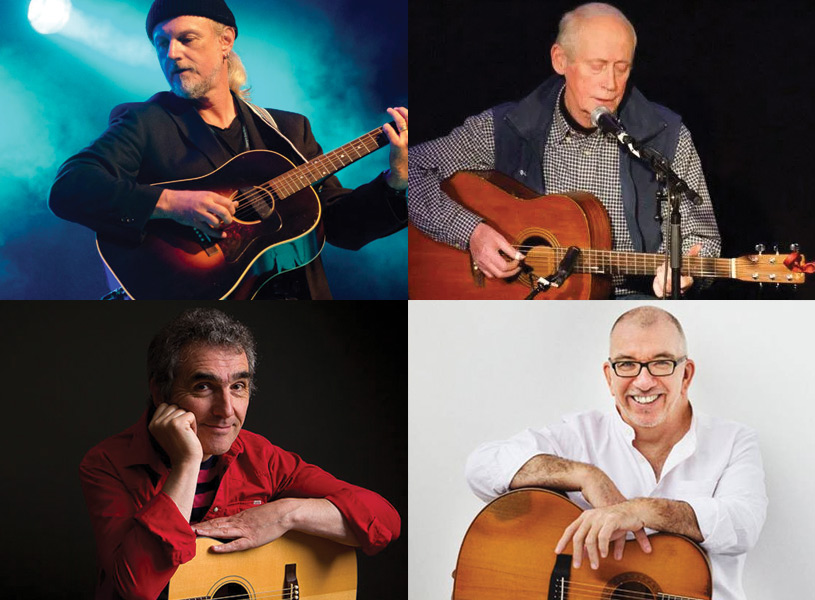
- This event has passed.
Archie Fisher, Garnet Rogers, James Keelaghan, Jez Lowe
Friday, February 26, 2021 Friday, March 12, 2021
The musicians have given permission to replay their concerts. The donation link(s) will allow listeners to send a donation directly to these artists.
From the Archives:
Archie Fisher (April 16, 2010)
Jez Lowe and James Keelaghan (Oct. 4, 2013)
Garnet Rogers and Archie Fisher (April 1, 2011)
Donation links:
Garnet Rogers: Paypal to info@garnetrogers.com
Archie Fisher – TBA
Garnet Rogers
“A brilliant songwriter. One of the major talents of our time.” -Boston Globe
In a darkened bedroom, lit only by the amber glow from an old floor model radio, two young brothers aged 6 and 12 lay in their beds, listening to the country music broadcasts from the Grand Ol’ Opry, and practiced their harmonies. Two years later, the youngest one was playing the definitive 8-year-old’s version of “Desolation Row” on his ukulele. He soon abandoned that instrument to teach himself the flute, violin and guitar.
Within ten years, and barely out of high school, Garnet Rogers was on the road as a full-time working musician with his older brother Stan. Together they formed what has come to be accepted as one of the most influential acts in North American folk music.
Since then, Garnet Rogers has established himself as ‘One of the major talents of our time”. Hailed by the Boston Globe as a “charismatic performer and singer”, Garnet is a man with a powerful physical presence – close to six and a half feet tall – with a voice to match. With his “smooth, dark baritone” (Washington Post) his incredible range, and thoughtful, dramatic phrasing, Garnet is widely considered by fans and critics alike to be one of the finest singers anywhere. His music, like the man himself, is literate, passionate, highly sensitive, and deeply purposeful. Cinematic in detail, his songs “give expression to the unspoken vocabulary of the heart” (Kitchener Waterloo Record). An optimist at heart, Garnet sings extraordinary songs about people who are not obvious heroes and of the small victories of the everyday. As memorable as his songs, his over-the-top humour and lightning-quick wit moves his audience from tears to laughter and back again.
“Garnet Rogers is capable of awe-inspiring and unpredictable stuff – and that includes more than just music”
Resolutely independent, Garnet Rogers has turned down offers from major labels to do his music his own way.
Archie Fisher
Archie was born in Glasgow into a large singing family, which yielded three professional singers—Archie and his sisters Ray and Cilla Fisher. His father’s appreciation of many musical styles (opera, vaudeville, traditional ballads) proved to be a heavy influence on Archie’s music while his mother, a native Gaelic speaker from the Outer Hebrides, influenced the lyrical quality of his songwriting.
Archie first became interested in folk music during the Skiffle era of the late 1950’s and such performers as Lonnie Donegan and Johnny Duncan. Later, the recording of the Weavers at Carnegie Hall also had a profound effect on his approach to music and his political outlook. During the TV folk boom of the 1960’s and 70’s he appeared regularly with his younger sister Ray on magazine programs and the BBC Hootenanny series. He was based in Edinburgh at the time in the contemporary company of musicians such as Robin Williamson, Clive Palmer and Mike Heron (who together formed The Incredible String Band) and was an early guitar colleague of Bert Jansch.
Archie’s first self-titled album was recorded in 1968 with the fiddle and mandolin of John McKinnon and whistle player John Doonan. During the mid 1970’s he formed a long-term partnership with Dundee musician Allan Barty, which was later grafted on to the revived pairing of Tommy Makem and Liam Clancy. As well as performing as a backing musician and arranger for the Makem and Clancy duo, he also produced a series of albums with them.
Meanwhile, Archie got involved in record production with the dynamic Scottish band Silly Wizard. During the 1980’s he turned his attention to freelance radio work and originated several series of documentary programs with his local station Radio Tweed. He then returned to the recording studio during what he describes as one of his most creative songwriting periods. It was around this time that he began a partnership with Canadian songwriter Garnet Rogers. They toured throughout North America together, and Garnet produced two Fisher albums including the highly acclaimed Sunsets I’ve Galloped Into, which was released on Red House Records in 1996.
Following the success of that release, Archie toured throughout North America, playing with John Renbourn and Bert Jansch. In 2008 Red House released Windward Away, a collection of introspective ballads that evoke the wild and rough beauty of the Scottish Border country. While working on this album, Archie discovered a copy of an old recording he made in the late 1970’s while working with Tommy Makem and Liam Clancy. Although several songs on this missing master had been recorded on other Archie Fisher albums, this missing master had never seen the light of day. Because he believed these recordings represented an important period in his music, he felt they were worthy of formal release. Together Windward Away and The Missing Master represent more than 28 years of Archie’s distinguished writing and singing career.
Seven years in the making, the 2015 release, A Silent Song finds Archie combining original compositions with his interpretations of classic songs for a wonderful addition to his distinguished catalog.
Jez Lowe
Jez Lowe “Old Bones”
Jen Lowe “Black Diamonds”
James Keelaghan
“The Fiddle is one of the iconic folk clubs in the United States, easily one of my top five folk clubs for the atmosphere, the attentiveness of the audience and the general warm feeling. Especially on a cold January night…at least I think it will be chilly in January in MI? Right?” – James Keelaghan
As the calendar pages have turned, for almost a quarter of a century now, this poet laureate of the folk and roots music world has gone about his work with a combination of passion, intent and intensity, and curiosity.
Fusing his insatiable appetite for finding the next unique storyline Keelaghan also forges his pieces with brilliantly defined craftsmanship and a monogrammed artistic vision, making him one of the most distinctive and readily identifiable voices of not only the Canadian scene, but as a member of the international singer-songwriter community.
Armed with a songbook that has enlightened and enthralled, and been embraced, by audiences around the world, Keelaghan’s life as an artist is one that is a perpetual journey on so many levels.
Most importantly it’s a journey that has invited fans of literate and layered songwriting to be a part of his artistic expeditions, some that weave their way through marvelously etched stories of a historical nature with underlying universal themes, and others that mine the depths of the soul and the emotional trails of human relations.¨His masterful story telling, over the course of nine recordings, has been part of the bedrock of his success, earning Keelaghan his share of nominations and awards, and acclaim from Australia to Scandinavia.The necessity to write has always been a double-edged sword.”
“I’ve always had the urge to write. Some things weren’t being said in the way I wanted to say them. Then there are the different sides of what I write about. The narrative writing, the historical material, as well as the personal, where you have to take responsibility for what you are saying,” says the Calgary native who has been calling Winnipeg home for the past few years.A disciplined visionary, Keelaghan’s aces have long been a love of language, and history, as he earned a history degree years ago, his skills as a thespian that he acquired at an early age, that explain his ability to make an immediate connection with audiences in a live setting, and an ear for a memorable melody, and harmonies that make those melodies glisten.
“I’m good for 80 or so books a year, mostly history, non-fiction, but inspiration can come in many forms, I’m always on the lookout for a good story or idea. My sister told me the story that became Kiri’s Piano. It was such an image,” says Keelaghan that visits a dark chapter in Canadian history, Japanese interment camps in the Second World War.â’¨ â’¨Not only does his deep catalogue include timeless originals like Fires of Calais, Cold Missouri Waters, Jenny Bryce, Hillcrest Mine, and Kiri’s Piano. Keelaghan is also a possessive interpreter of outside material, a fine example being his gripping take on Gordon Lightfoot’s epic Canadian Railroad Trilogy on the Lighfoot Tribute disc Beautiful. There are a number of illustrations of his interpretive skills on his 2006 recording A Few Simple Verses. The closing tune on that spellbinding set, My Blood written with Jez Lowe, is one of many examples in Keelaghan’s career, where he has invited collaboration into his creative process.
“I was at the Celtic Colors Festival in 2008 and the producers locked six of us in a house for a week, and the company included Dave Gunning, David Francey, and Rose Cousins, it was an amazing experience. We had to come up with enough material for a show at the end of it.“To go along with a lifelong accumulation of influences, there have been these opportunities to work with equals, whether if be Oliver Schroer, Hugh McMillan, or Oscar Lopez. The sparks of collaboration, batting melodies back and forth, whatever, have produced some wonderful results,” says the artist who ties it all together with a powerful voice, delivery, and a commanding presence where he finds a balance between examining the lighter and heavier sides of life.
For Keelaghan staying at the top of his game comes down to a very clear rule, “never stop accumulating.”
“I want my audiences to know that I am open enough to try new things and push their bounds.”
It was Dave Marsh, the award-winning American music critic and historian who not so long ago stated that James Keelaghan is “Canada’s finest songwriter,” and those few but powerful words of praise say it all about an artist who continues to set the bar at a lofty height.
